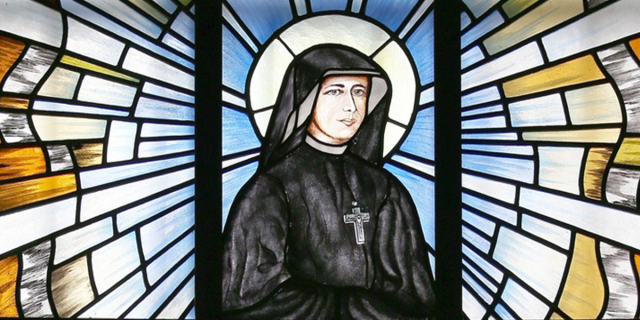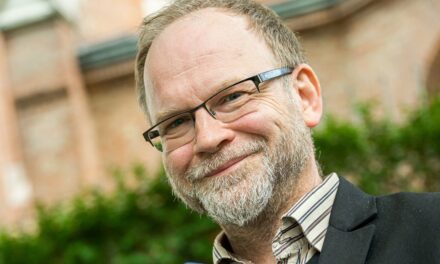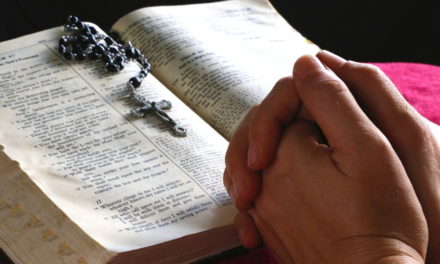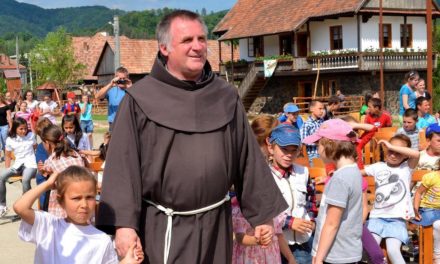In 1905, in a small Polish town, Glogowiec, Faustyna Helena Kowalska was born as the third child of a deeply religious, simple family, who today is known and respected by the Christian and Catholic world as Sister Saint Faustina. He, who wrote his name in the history of humanity in the 20th century as a mediator of Divine Mercy, lived his life of barely thirty-three years, full of work, prayer, illness and suffering, away from the public, in complete obscurity. In the eighty-three years that have passed since his death, we have recognized and respect him as the bearer of one of the most important divine messages of our time.
The uneducated young girl, who does hard physical work for her family and her own livelihood, occupies a prominent place and role in the ranks of the saints of the modern age: during her encounters with Jesus Christ, she reached us through her divine compassion, the confirmation of Jesus Christ's presence in our lives, which is still valid today message.
At the request of his confessor, he recorded in his diary his encounters with the Savior, which took place under ordinary circumstances. This is also what makes them special: they don't have a special place or time, Faustyna didn't sink into some kind of meditation, trance, or mystical state of being because of them. He also heard the words of Jesus in the everyday moments of life.
One of the important turning points in his life, for example, was the meeting when he took part in a dance party with his sister when he was 18 years old. While dancing, Jesus appeared to her and reproached her: "How long will I suffer because of you, and how long will you lead me astray?" Faustyna does not ward off the apparition that came at an inopportune time and the bitter questions, but immediately leaves the dance party and goes to a nearby church, where she prostrates herself before the Blessed Sacrament. He knows what the Savior asked him, because he himself feels that he carries an unfulfilled promise: even though he has wanted to devote his life to God for a long time, everyday life has not brought him any closer to this. What should you do? he asks Jesus. "Travel to Warsaw immediately, you will enter a convent there!" Faustyna, a young country girl, does not know the capital, yet she immediately fulfills the order she received - which will change her entire life - she immediately packs up and travels, telling her destination only with her sister. He cannot count on the patronage of anyone in the big city, the help of the Virgin is the only thing that guides him, and that is enough. However, the doors of the convents did not open for her: in 1923, during the economic crisis following the First World War, even the monastic communities who had taken a vow of poverty found it difficult to live, a destitute young girl was not needed anywhere. Finally, she visited the Congregation of the Sisters of the Mother of Mercy. The boss tested the seriousness of his intentions, she asked him to work somewhere for a year before joining. Faustyna takes a job as a domestic worker in Warsaw, and a year later she reports again to the monastery, the doors of which this time open for her. It was not easy for him to fulfill Jesus' command, but because he wanted with all his heart and dared to put his life on the line, he succeeded in the end.
We can ask why the second Divine Person singled out this poor young girl for the great task entrusted to her? How did he know that he would be the one who would listen to him, take him seriously, and be able to fulfill the mission entrusted to him?
We can be sure that Jesus spoke to many of us, like Sister Faustyna, even then, today, even from the beginning in every historical era. This uneducated, young Polish girl became one of the chosen because she heard and obediently followed the requests and commands of Jesus. Sister Faustyna believed it, considered it the natural task of her life to listen willingly to God and his Holy Son. He perceived the words of Jesus, perhaps not even heard by others, perhaps dismissed, as the same reality as any other phenomenon of his life. It was her deep faith and capacity for unconditional obedience to God that made this young girl extraordinary.
Do we possess - if not similar to Faustyna - but at least to a greater or lesser extent these qualities?
Many people feel that hardly anyone can love God, Jesus Christ or the Virgin Mary more than them. But do we dare to hear their requests to us? Most of the time, our prayers follow the opposite path: we ask and ask for graces for ourselves, our family members, our country, and the whole world from God, the holy angels, and the Virgin Mary. People with a prayerful spirit ask for evil in the rarest of cases, because they know that the God of Love does not intend evil for anyone. However, our countless requests are all fed by our earthly desires, and it is probably precisely because of these, our earthly desires, that we do not pay attention to God's requests to us.
Let's honestly think about the mentioned famous scene from the life of Sister Faustina: in the middle of a whirlwind dance party, who among us would pay attention to Jesus' reproachful words - certainly not appropriate for a dance party? And who among us does not shrug his shoulders at the impact of these words and think to himself: "How much I prepared for this party, how difficult it was to get this beautiful dress and shoes... My mother also let me go... When should I dance, if not when I was eighteen? Why didn't you tell me sooner, Lord Jesus, if you didn't want me to come here? I will do your request tomorrow, nothing depends on this one evening!" – And so on, we can list our perfectly appropriate excuses from a human point of view for a long time.
Instead, Faustyna immediately left the party and went to the nearest church to ask Jesus: "What do you want me to do for you, Lord?"
This amazing devotion to Jesus can be seen as his greatest, most unique talent. It was this love, ready to renounce and follow, that the Savior found in him - to a unique, heroic degree among his many excellent creatures - and he knew that he could entrust the 20th century's world war, devastating pandemic, world crisis and to this unconditional devotion. his most important message to the suffering man, the one that does not let the salvation sink into oblivion: - Do not be discouraged, because God is merciful!
Jesus, I trust you! - this is the sentence that our Savior delivered to us in the spirit of this message through the mediation of Sister Saint Faustina, together with the flood of white and red light emanating from her heart. This is the key phrase of our life. If only a fraction of faith, of unconditional trust in God, lives in us, this sentence will help us in every situation of life. This is the sentence that we must say to Christ who was crucified for our sins and died glorified on the cross with the same faith as to the one who resurrected triumphantly at the dawn of Easter Sunday: - Jesus, I trust you!
Author: Mezey Katalin Kossuth awardee
Cover image: east-news













